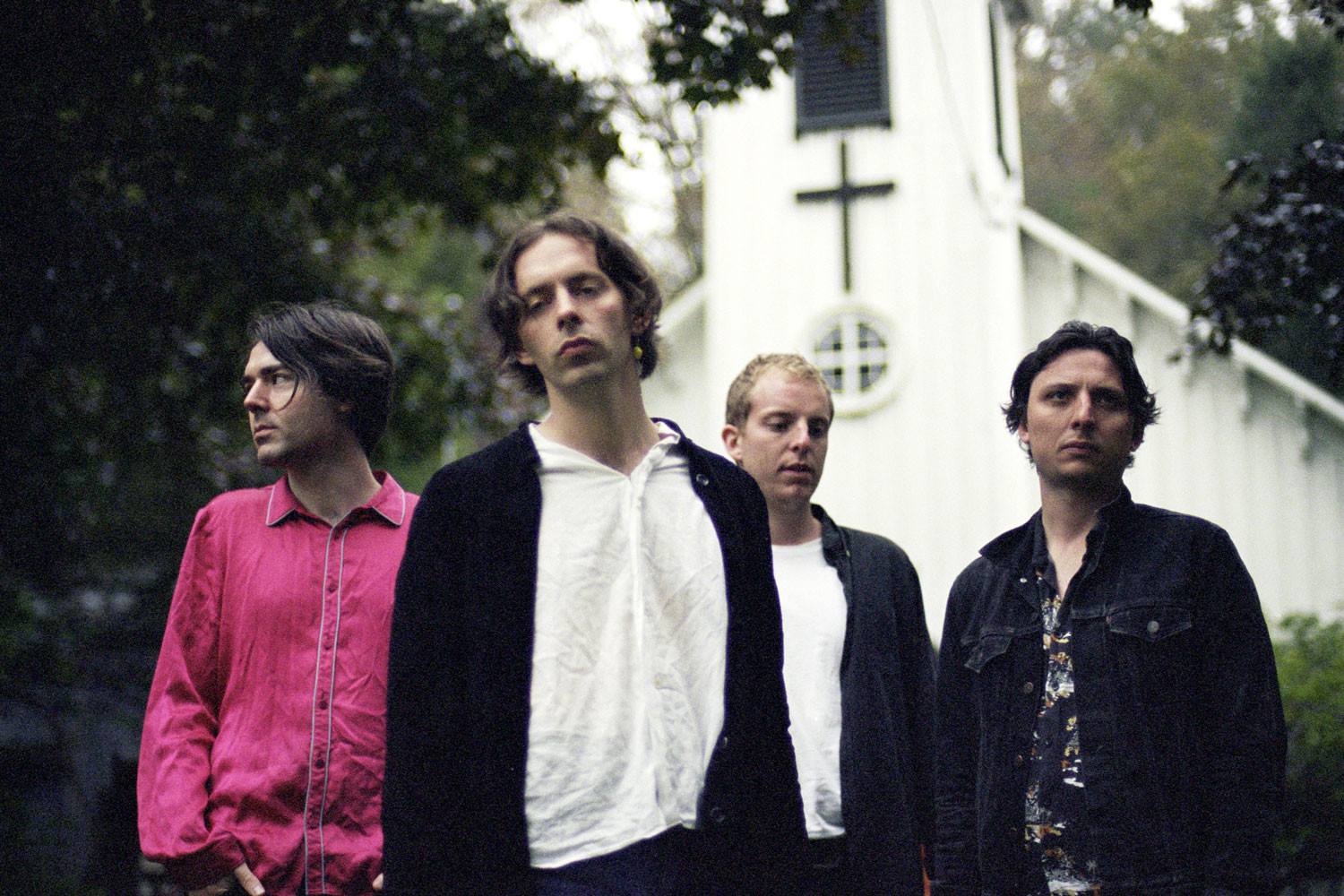It’s been half a decade since Peace burst onto the scene with melon slicing swords in hand and bubbling indie anthems in tow (feel old yet?), and a lot has changed. It’s no surprise then to find that the quartet have come a long way since their ‘Bloodshake’ days of 2012. Taking time out of the limelight has allowed them to return not only reinvigorated, but refocused.
Teaming up with mental health charity MQ, Peace are (one among many) swearing It’s Time To Give A **** About Mental Health In Young People. Their showing of solidarity arrives in the guise of their most open song yet. ‘From Under Liquid Glass’ is an enduring reflection on depression and anxiety, a voice of solidarity for anyone who’s ever felt the same. Frontman Harry Koisser talks us through his very real inspiration, breathing underwater, and the enduring strength that can be felt in shared experience.
Where did your inspiration for the song come from?
I’d had a lot of time off. I stopped writing songs a little bit, and sunk into myself for a little while. It was just in complete stillness. It was almost when everything had ground to a complete halt. I was not expecting to do any writing, and it just popped out of nowhere. I just think that when you’re trying to write songs, you almost push agendas and things that you want to write about. Then when you stop, you write about the things that you need to write about, I guess. When I switched off from songwriting mode, it came out.
Was it hard putting something so personal into words?
I wasn’t really trying to write a Peace song, or trying to write a song at all. It was more of a kind of selfish, cathartic moment or writing, just scribbling down anything. It kind of just all started to come out. It probably took about seven minutes in total to write the song, lyrically. I had melodies with it. I started playing it, and found it quite amusing. I cheered myself up doing it, the whole process of writing it and doing a demo about a minute and a half after that. It wasn’t laboured over at all, whatsoever. It was the opposite, which was a nice surprise, I guess, in hindsight.
Where did the song’s title come from?
It was a phrase that I’d used to describe the feeling that the song was written about, being trapped under liquid glass. It just popped into my head, and that’s what I wanted the song to be called. We’d be nicknaming it loads of things. It doesn’t always have to be the main lyric or whatever. It represented the song quite nicely for me. Everyone really liked it.
The lyrics are very straightforward. Was that an intentional choice when you were writing?
I didn’t want to be too poetic. It’s kind of nice seeing it appear on paper in front of your eyes and being big and brash and straightforward. Everything that you always fear people thinking about you, just putting it out there and being bold about it, brash, and confident, which isn’t something that I usually am. I didn’t want to dance around it, or make something that only means something to me.
[sc name=”pull” text=”Maybe the song can just act as a little bit of glue between people.”]
As well as being straightforward, there’s a sense of strength in these lyrics. Was it important to you that you captured both of those sides in the song?
I think it’s an important image. It feels really over the last year or two that being open and forwards and confident and relaxed about speaking about mental health issues has become a thing. When I was growing up it definitely wasn’t. Even in my younger adult life, it still didn’t feel like something that people were very comfortable about. In the last year or so, it just seems to have come into collective consciousness that it’s okay. I think that’s what I was trying to reflect by putting it into a song – even if it wasn’t in the front of my mind at the time, but by going through with it and using the song and polishing it. What we were going for is trying to reflect that and go with it and have that collective openness about mental health issues.
There’s still a way to go, but it really feels like there’s a platform for addressing issues like mental health that maybe wasn’t there a few years ago. What’s it like seeing that build, and playing a part in addressing that?
It’s a really exciting feeling. I didn’t realise this, but over 70% of mental health issues begin before the age of 18. If you’re young now, it’s really exciting to think that you could be completely cool to be able to openly discuss these things, and for it to be part of our culture even, to be able to discuss mental health issues and be comfortable about it. That’s really groovy. It’s strange that it wasn’t as such when I was that age, and that it hasn’t been for the history of time.
How did you come to partner up with MQ for this release?
I’d written the song and sent it to my manager and the band. There were about six people who’d heard the song. Someone saw a billboard saying ‘It’s Time To Give A **** About Mental Illness – MQ’, and they called me. It was really strange hearing the song and then seeing this poster. It’s got the brash swearing, and the imagery is really akin. We sent them the song, and they liked it, so we had a chat and decided to go for it.
The video portrays some very striking imagery, all while keeping the focus on the words being sung and the issue been addressed. What was the inspiration behind that?
Jonnie [Craig], the director, is a really old friend of mine. He had heard the song before we asked him to do the video, and he said he loved the song, and he’d had some ideas. He liked the idea of singing under the bathwater. He was like, ‘These feelings are connected, and this image is massively connected’. It seems like it’s something that everyone does to sort of escape the real world for thirty seconds at a time or whatever. I think everyone I’ve spoken to since doing the video, or when we were doing it, has been like, ‘Shit; I do that!’
He came to my house and was like, ‘Get in the bath. I’m going to film you singing the whole song underwater’. It was so hard. It’s four and a half minutes long! We sped it up, and it was still really, really hard. He was like, ‘I’m going to come back in two weeks and we’re going to film it properly – you’re going to have to be able to hold your breath that long’.
In the meantime, he said he wanted two different imaginary scenarios of where you go to in that headspace when you’re lay under the water, and they needed to be really normal. It couldn’t be, like, me riding an elephant through the sky. He was like, ‘I want one to be on the grass, and one on the carpet’. That was it. The vocal delivery, that’s all it is. All just to emphasise the lyrics rather than have too many bells and whistles. The song meant a lot to him. It was his visual interpretation of the song based on his experiences, which I thought was cool. He took what the song meant to him and visualised it.
[sc name=”pull” text=”There’s a safety in numbers.”]
What has it been like sharing something so personal with the rest of the world?
I was kind of nervous because I was writing something that’s swearing. ‘I’m left alone with my big fucking mental head’. It’s quite an interesting way to say to people that you’ve been having a hard time. I don’t feel that shy about songs anymore, as long as it’s real. I think everyone understood and liked it. It’s a weird thing – using a song as a vessel to be confident about something that you’re quite unconfident about was quite a rewarding feeling. That’s what music’s all about! Putting something into song that you can’t put into words. That’s the majesty of music, right in front of my eyes.
What’s the response been like from your perspective?
It’s been very warming. I think the first day or two days I didn’t want to look at anything. Then I looked. I think it means a lot to a lot of people, which is good. I had a lot of people who I haven’t spoken to for years, who I went to school with, they got my number, and they’ve been texting me like, ‘This song means so much to me’. I was like, ‘Fuck, haven’t spoken to you in years’. That’s a really strange feeling.
The reason why I let the song be developed and put out was that someone convinced me that there was a positive impact to be had from it for people. At first, I was like, ‘I don’t want to put this song out – it’s my song, it’s my personal thing’. They were like, ‘No, you should put it out because it can positively impact people to know that you are there to be a spokesperson into the universe for it via music’. Seeing that kind of come true was very warming and interesting and scary and groovy, I guess. It’s kind of what music’s about.
When you started this partnership with MQ to release this single, what were you hoping people would take from it?
Having mental health issues is such an isolating experience – any isolating experience is sort of akin to this – but there are so many people that are all experiencing that. In fact, I think that everyone does at some point in their lives. The fact that everyone individually does, that makes it, in the bigger picture, a less isolating experience. Maybe the song can just act as a little bit of glue between people. I’m sure that if you looked on a YouTube video of it and the comments of the amount of people that relate to it, it would be a kind of, ‘Oh shit, there’s a safety in numbers here’.
For more information about MQ, visit mqmentalhealth.org.





